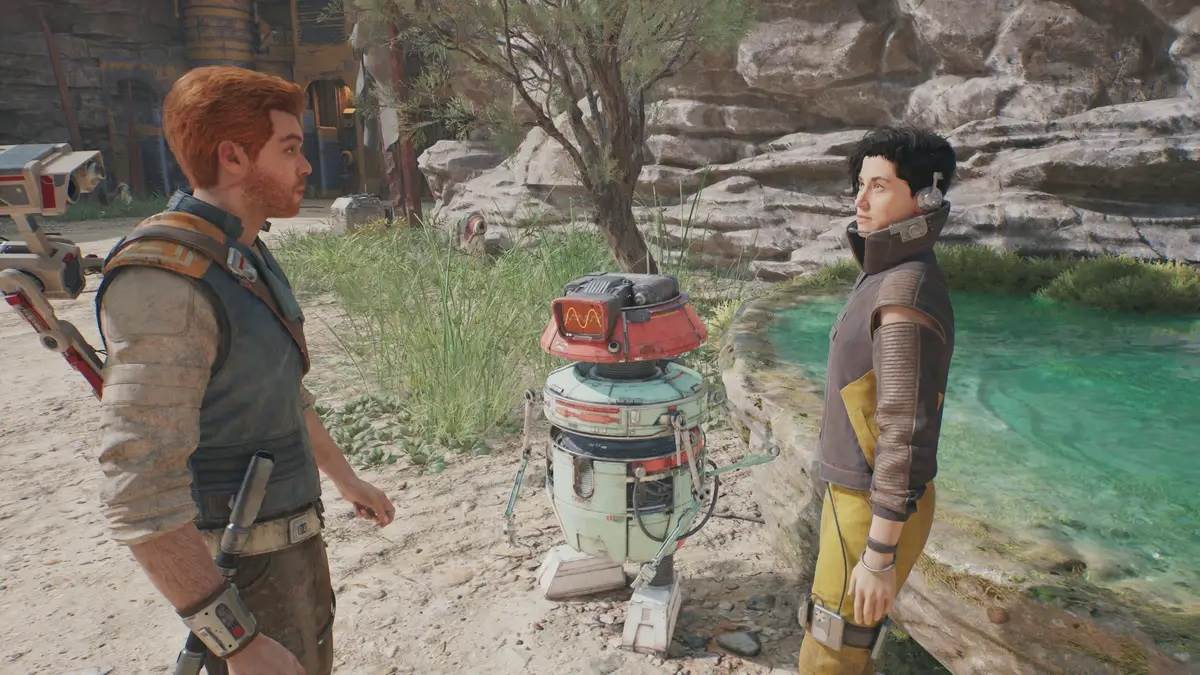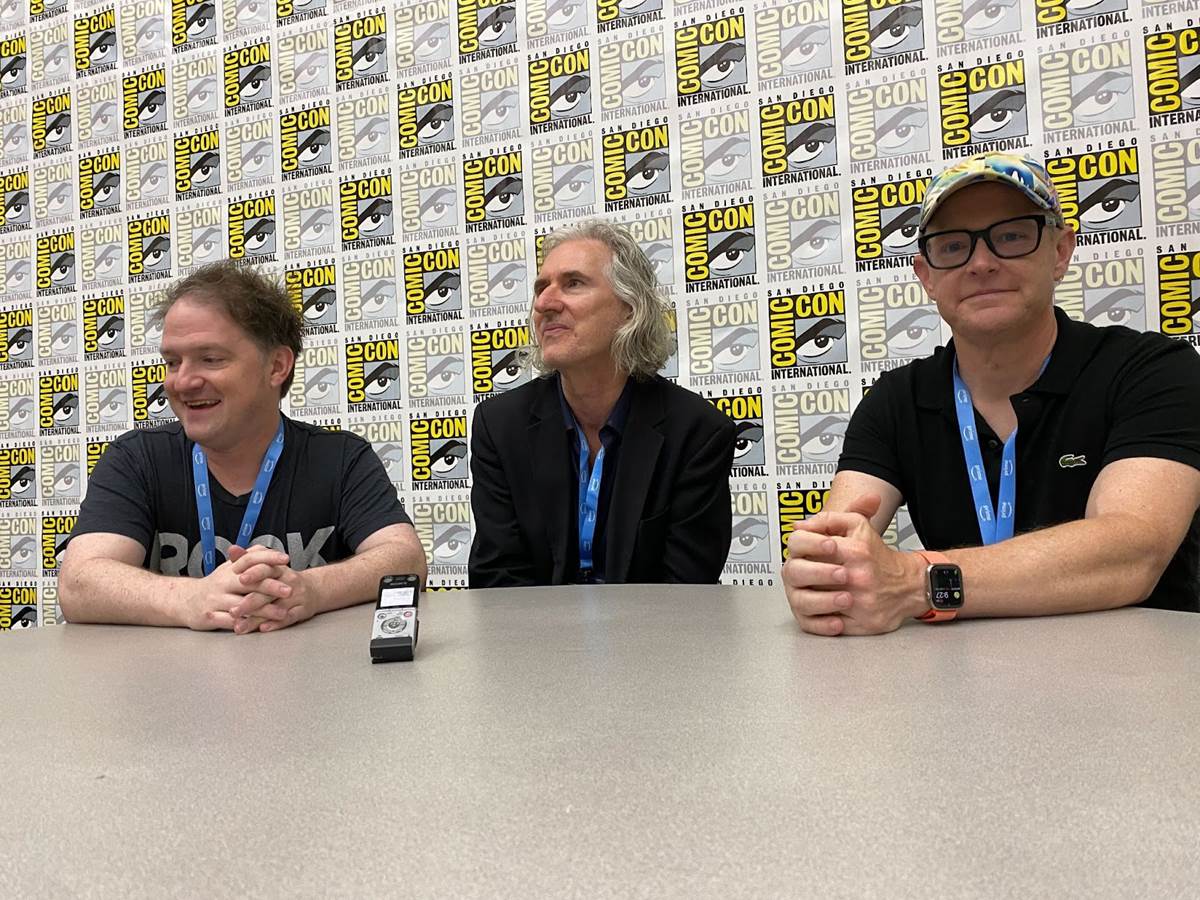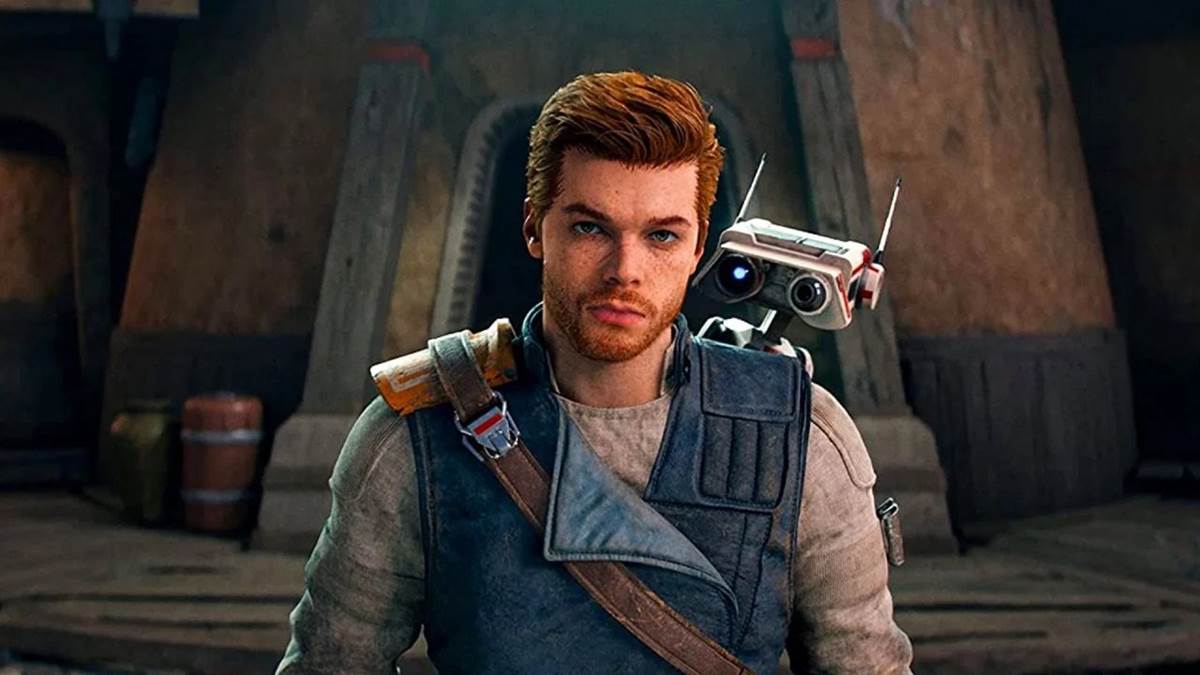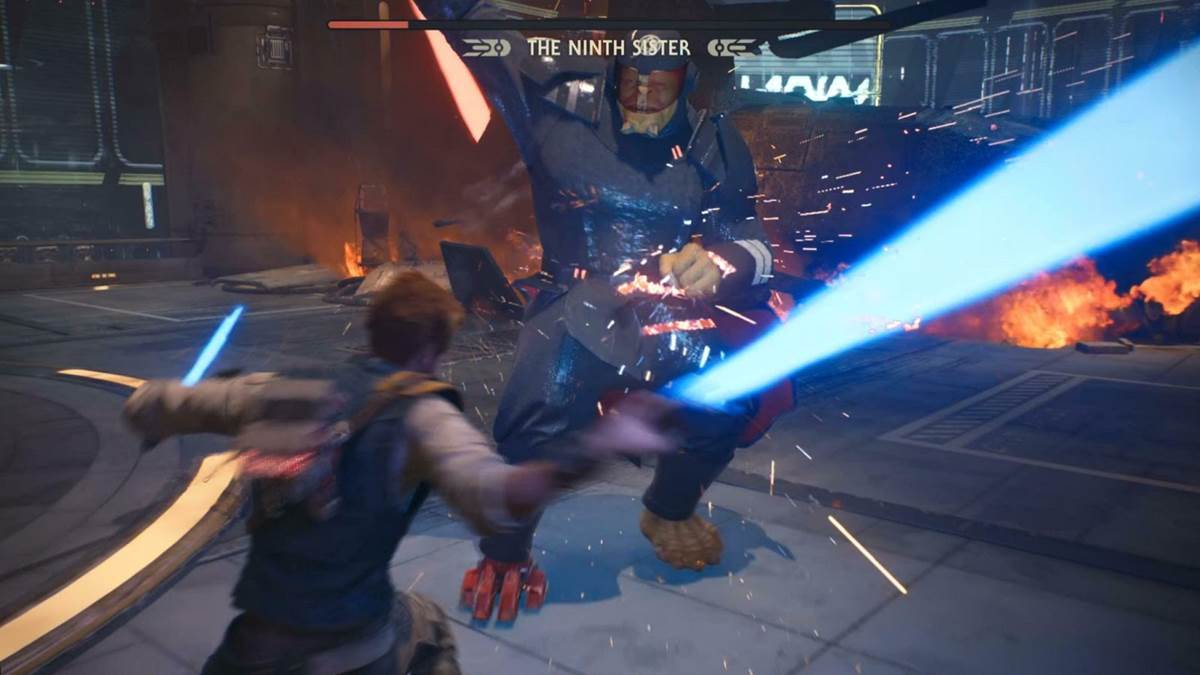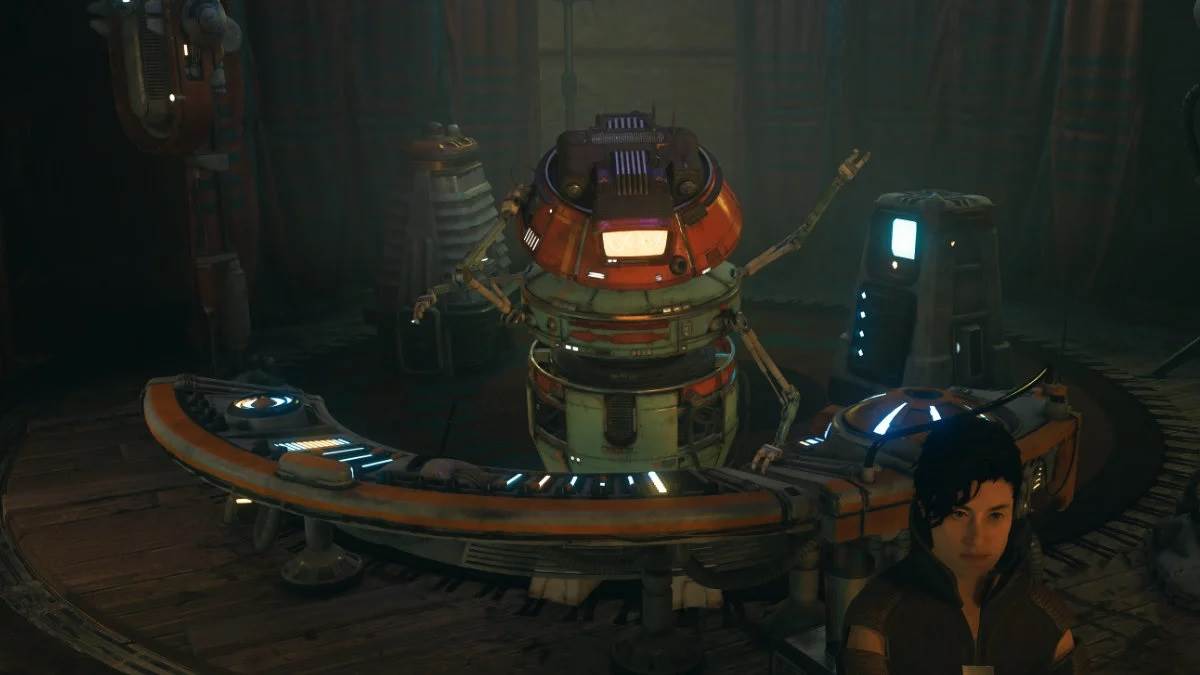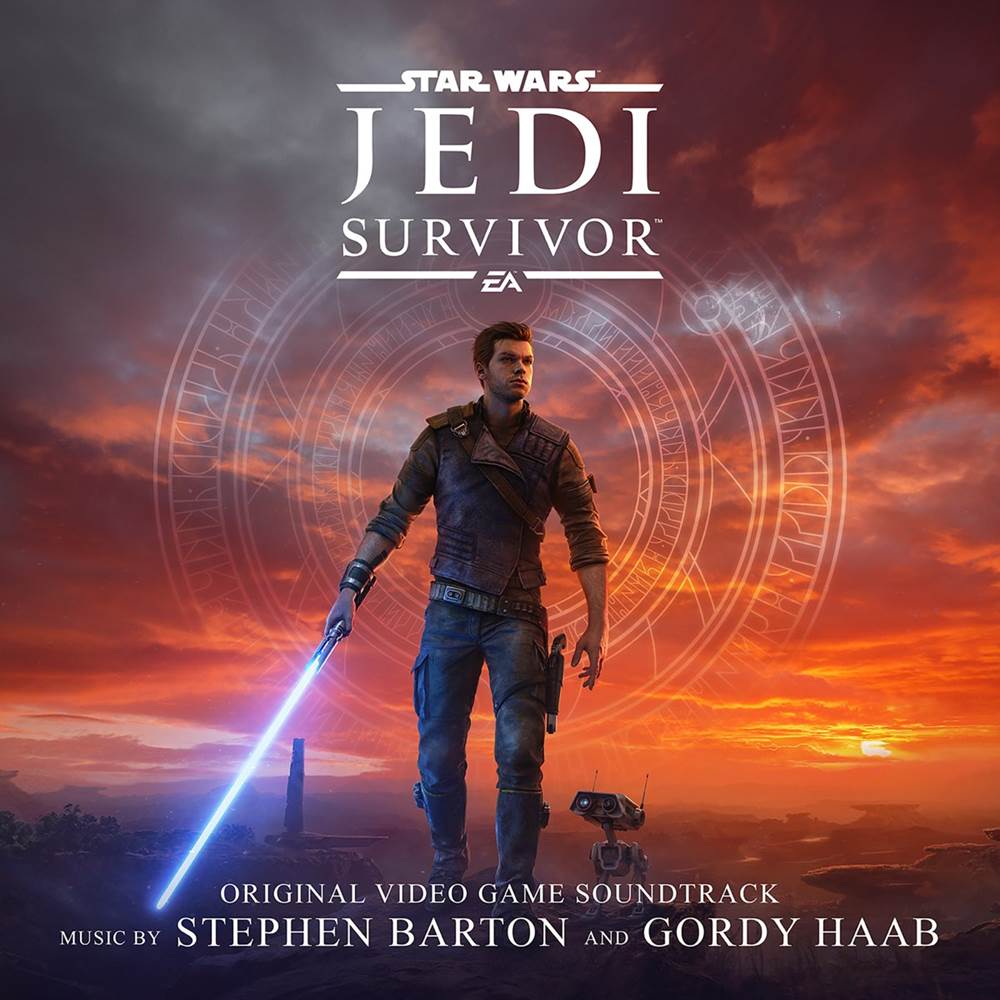Interview – The Music Composers for “Star Wars: Jedi – Survivor” Discuss Their Acclaimed Work at SDCC 2023
At this past weekend’s San Diego Comic-Con 2023, I had the wonderful opportunity to participate in a roundtable interview with the composers of the acclaimed musical score for the recently released smash-hit video game Star Wars: Jedi - Survivor, Stephen Barton and Gordy Haab, along with the game’s music director Nick Laviers. Together they talked about the process of creating music for an expansive video game set in the Star Wars universe.
Q: Do you have to be a composer to be a music director?
Stephen Barton: Well, you are. [laughs]
Gordy Haab: I think it certainly helps.
Nick Laviers: These two chaps have made me a better composer, I’ll say. The nice thing about working with them is I can nick at all their ideas.
Barton: [laughs] Well, I certainly steal Gordy’s ideas.
Laviers: The other thing is, I don’t actually have to carry the can for any of the stuff that I do. [laughs] It’s all on them, so I’m in a win/win situation.
Haab: We take the fall for everything. [laughs]
Laviers: Sorry. [laughs] I do have a protective umbrella over you, as well.
Q: When it comes to composing for a game, are there different approaches or timetables compared to TV or film?
Haab: First and foremost, it’s just the vast amount of scenarios that call for music in a game, because these games are very long, and a film is not necessarily the longest form. You have two hours, the music is going to be no more than two hours, but a game experience can be 30 hours long. It’s like, ‘How do you fill that much space?’ So you really have to pick and choose moments where music is really impactful and focus on those, and try to stretch it as much as possible. But it really just comes down to story. Whatever the story’s really calling for usually dictates what the music is going to do, and so we’re very conscious of the narrative and just making sure that we’re showing the perspective of the character. We want the audience to feel emotions, so you’re always telling a story through a character’s eyes with music. That can shift based on the player’s input, so you have to be conscious of all these things. It’s kind of a technical job, but also very much an artistic [job]-- trying to craft emotion around a narrative.
Barton: The other nice thing about games is, you can get called up for a film three weeks before. I was on a movie called Team America and we– I was working with Harry Gregson-Williams– and we scored that thing in eight days. It was fun [and] the movie was awesome, but [I] never want to do that again. [laughs] Whereas [with] games, the nice thing is you get two or three years sometimes, and we might even put a project aside for a few months and then come back to it. That ability to have a perspective and fresh eyes on something is really helpful, because you can sometimes come back two months later and go, ‘Eh, that wasn’t so good.’
Laviers: And all the time the game’s evolving as well, so it’s this technical thing. Sometimes you have a musical problem that the game will solve for you. ‘Well, what do I do here? Oh, right. We can have explore music leading to combat music here.’
Barton: Or, ‘We’re struggling with this level. Oh, they deleted it. Okay, great.’ [laughs]
Laviers: There is that as well, yeah. [laughs]
Haab: It’s this nebulous thing that’s constantly changing.
Laviers: Yeah, so part of my job is staying on top of all that, and being close to the game, playing it every day. The nice thing about working on Respawn games is that they’re usually really, really good right from the get-go. Just different flavors of good as we go through.
Q: How does the actual gameplay seep into the music?
Haab: It certainly dictates exactly what the music does. The game mechanics control the choices we make.
Barton: We often literally key off mechanics, too. The way we trigger music is often literally something happens, or you do something on a basic level like a button press that you have, that is actually also the way we trigger the music, but it’s also– a lot of it– we’re looking at trying to match people’s gameplay styles, as well. Less so in Jedi, a little bit, more so in maybe other games where if you have a choice where you have to be stealthy or to be the opposite of stealthy, you want the music to not blaze on regardless. We do a little bit of that here as well, I think, in terms of your gameplay is usually more similar, but there are multiple ways you can approach a problem, and we want to accommodate that.
Laviers: On the last game we did, we had a kind of systemic music. This game we decided to do more with storytelling music, but then we connect it together with the systemic music, which is exploration and combat.
Barton: Which is sort of like logical music, where basically it has a pool of music it can play from, so you won’t necessarily get the exact same thing twice. But it’s based on trying to be able to cover if you have an hour, but we only have ten minutes of music that we can use to cover that, ‘Where do we actually need to use it?’ and ‘What are we going to repeat?’ if we are going to repeat, which we try not to, actually.
Laviers: Yeah, we had to budget that stuff a lot, because sometime you’ll run out. ‘Oh wait a minute, we don’t have enough explore music for this particular area, so where can we grab something else from?’ There’s a lot of that, but the nice thing about this game is that the three of us were working on that technical spec pretty much from the beginning, probably before we wrote any music. So all of the music writing was done with that technical spec in mind, and we stuck with the same spec. We enhanced the spec, and we developed it, but the basic spec was there right at the beginning.
Haab: And because it was there from the beginning, it actually made writing the music a lot easier, because the systemic nature of it vanished into the background– because that’s just a parameter you’re dealing with, and so you just write music. Versus some games [which] are much more systemic, like the Star Wars: Battlefront series. Those are very systemic, like when you get to ‘X’ point, this piece of music kicks in, and if you choose to go this way, then it has to transition to this piece of music, and when you finally win it pulls up a winning stinger or a losing stinger. And either way, it can be based on which faction you’re playing for, and so there’s so much puzzle work going on that’s built into the engine. With this game, because it’s much more narrative, it gave us the ability to stretch out a little bit.
Laviers: Yeah, the systemic stuff doesn’t dominate the game. It’s something that we can turn on and off. So we’ll go through swathes of the game which [are] just sequential music– scripted music.
Q: From a composition standpoint, what are some considerations on writing for games where the character has a different tone based on the player’s choices?
Barton: You don’t often want the music to be too conscious of what you’re doing, because otherwise it can get to be almost like an annoying football commentator: ‘Hey, you’re being stealthy now!’ ‘I know, I’m playing the game. I can see it on the screen.’ So often it’s a more subtle shift, and sometimes people build games where they go for something really, really systemic– every little thing you do is going to influence the music a little bit, and it often doesn’t work as well as it sounds. It sounds fantastic on paper, ‘Fully interactive music!’ but actually often it doesn’t work all that well. And particularly also with Star Wars, where so much of the music is trying to be very wide-angle lens. It’s trying to speak to the overall emotion, or even context and subtext, and isn’t necessarily talking about the specific action literally going on screen, so sometimes it’ll be little shifts in rhythm, little shifts in meter. And then often it’ll be, if we’re switching between different pieces of music, figuring out how we make that transition and where. Because also, the other thing is sometimes if you can press a button and something immediately happens in the music, you see the mechanics working. It gets annoying; it gets really irritating.
Haab: Yeah, you never want to see behind the curtain.
Barton: We want to make it feel seamless, and nothing from a gameplay experience should ever take you out of it. That’s the ultimate goal.
Haab: And I think with characters, if you have a character that has a story arc, then the best thing is to try to create a theme that is malleable enough to change with that arc, which is common in film scores with great themes. The theme can be uplifting, and then that same theme could be dark and somber. It’s just how you treat it, changing key or do it in a minor mode instead of a major– very generic tricks. It certainly is more complicated than that, but…
Barton: And we playtested a lot, as well. Some game composers don’t do this, and you can do it whatever way you like, but I think that now these projects are getting so complicated, you have to sit hands-on and play, and just see what the experience is like.
Haab: It’d be like scoring a film without watching the movie. It doesn’t make sense.
Laviers: Yeah, we’re all within range of the same building, so we’ll get together frequently throughout the course of the project and play through.
Mike Celestino, Laughing Place: I love the score, it’s awesome, but I want to ask about the in-universe music that plays in the cantina in this game. As the music director, can you talk about how that came together, and then as the composers, did you have any input on that?
Haab: Well, we had quite a bit.
Laviers: To start, they’d kill me if I didn’t say it was the three of us doing it– not just me. We have a lot of things on the project. We started working on this right from day one, pretty much– this idea of having the in-world music was an idea that was bandied around from pretty much day one. And the way we did it was we wanted to get the whole team involved, and we wanted to get our partners at [Lucasfilm] involved, as well. So we asked everybody what they thought.
Barton: We actually didn’t tell them what it was. [laughs] We crowdsourced; we said basically, ‘What are cool indie bands? Is there anyone off the radar? Who should we be listening to?’ I think we may have said, ‘Things that might connect to the Star Wars universe, but we’re not gonna tell you why.’
Laviers: Well, Lucasfilm knew what we were doing.
Barton: They knew, but the pitch was basically, ‘Every town has that cool radio station that everyone listens to where you hear good new music. What is the cantina playlist that you could hear on that radio station?’ If those songs appeared on another record that had nothing to do with Star Wars, you wouldn’t go, [derisively] ‘What’s this?’ So that was the idea, and we gave people the pitch that George Lucas originally gave John Williams for the Cantina music, which was to say, ‘What if aliens dug up the music of Benny Goodman in 2000 years, but they had no idea what the instruments were? What would it sound like if they tried to play it?’
Haab: We quite literally crowdsourced amongst ourselves, and amongst Respawn and EA and [Lucasfilm], a huge list of bands that we liked that we thought would fit this kind of vibe, and then culled through that list and whittled it down and went to those folks and said, ‘Hey, can you do a demo?’
Barton: We put no restrictions on it. We said, ‘You can put anyone on this list.’ And there were definitely people where we were like, ‘We’re probably not going to get them. They’re probably not gonna say yes.’
Laviers: We were discovering bands throughout the entire course of the project, over about the course of two years. The first one was the Israeli band TATRAN– [they were] the first ones that came on our radar. And we developed a process of working with the bands: we’d always do a Zoom call with them, the three of us, and we had a written brief to give them a box to work in, but then we said, ‘Don’t worry about the box. Just be you.’ [laughs]
Barton: That’s the other thing we were saying: if you’re going to hire whatever band, the thing you don’t want to do is go, ‘Here you go, now can you do this, please?’ Because then why bother hiring the band?
Haab: We didn’t want them to come back with an imitation of the Cantina music. We wanted to hear their unique approach to how they felt their music would fit into the Star Wars universe.
Barton: At the very outset, we also said, ‘We want to hear your take as if you could time-travel back to when the first movie was made, before Star Wars was even a thing, what would you have done to this brief?’ And they rose to that amazingly.
Star Wars: Jedi - Survivor is available now for PlayStation 5, Windows, and Xbox Series X/S. The audio version of this interview can be heard in Episode 163 of Laughing Place’s Star Wars podcast “Who’s the Bossk?"



